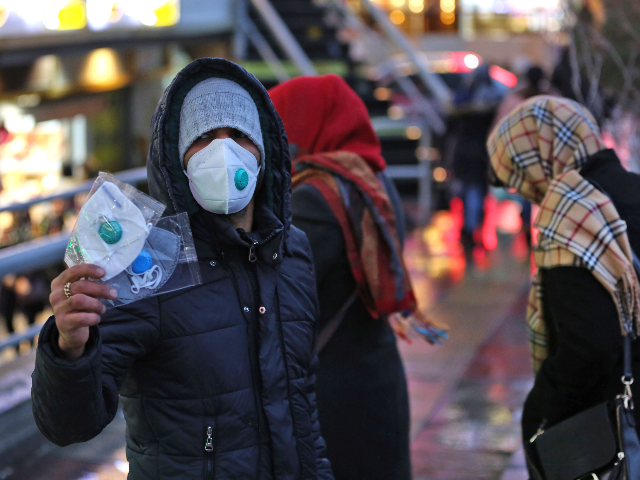Iran has confirmed 23 cases of Chinese coronavirus among its members of Parliament, the body’s deputy speaker confirmed on Tuesday.
The nearly two dozen infections join those affecting several other senior members of Iran’s Islamic regime, including a vice president, a now-dead member of Ayatollah Ali Khamenei’s advisory committee, and the man Khamenei put in charge of coronavirus response. Also in the group of affected lawmakers is reportedly a representative from Qom, where the first coronavirus cases were documented, who claimed Tehran was vastly underreporting the number of cases in that city and that its public health response was, at best, lackluster.
The elite cases of coronavirus join a confirmed 2,336 cases in Iran and 66 deaths attributed to the Chinese coronavirus. Globally, the World Health Organization (WHO) has confirmed 92,220 cases and 3,129 deaths, most of them in China. In addition to China and Iran, Italy, South Korea, and Japan have documented the largest number of cases.
Both lawmakers inside the country and dissidents using anonymous sourcing in Iran have claimed evidence suggests the official numbers are much lower than the actual number of known infections. In a press release Tuesday, the People’s Mojahedin Organization of Iran (PMOI/MEK), an anti-regime organization that operates globally, accused Tehran of downplaying the actual number of cases by a factor of 20. The group asserted that they had evidence for over 1,000 deaths attributable to the virus so far nationwide. The virus, the group claimed, is rapidly spreading in Iran’s notorious prisons, where many languish for simple opposition to the Islamic regime.
Iran has also become a hub for the virus to spread elsewhere in the region. Cases in Iraq and Afghanistan have been traced back to Iran, prompting international travel restrictions keeping Iranians out in other countries.
Radio Farda, the Persian wing of Radio Free Europe/Radio Liberty (RFE/RL), cited the deputy speaker of Iran’s Parliament, Abdolreza Mesri, as the source for the tally of 23 lawmakers affected by the disease. He reportedly attempted to downplay the severity of the outbreak and dispel the notion that the high number of political figures infected suggests that Iran has no control over the situation. Mesri reportedly insisted that the number of lawmakers infected made sense because of “their close contact with people” and the fact that they work in close quarters in Tehran.
“These people have a close relationship with the people and they carry different viruses from different parts of the country, which may create a new virus, so we recommend the lawmakers to cut off their relationship with the public for now,” Mesri reportedly argued.
Multiple lawmakers have publicly criticized the Iranian regime for their response to the public health crisis. MP Shahaboddin Bimeqdar objected in state media that Tehran did not act quickly enough to contain Qom, allowing Muslim pilgrims to the holy city to return home and spread the disease. Ahmad Amirabadi Farhani, a Qom lawmaker now confirmed to have the disease after exhibiting symptoms last week, was the first to vocally condemn the regime, claiming that Khamenei was hiding dozens of deaths and that his city was in dire condition.
Outside of Parliament, among those confirmed as coronavirus carriers are Iranian Vice President Masoumeh Ebtekar and Iraj Harirchi, the Health Ministry official in charge of coronavirus response. Harirchi appeared on television last week with signs of illness.
Coronavirus tends to cause flu-like symptoms in those who do exhibit any symptoms at all: fever, body aches, coughing, and other common cold symptoms. In severe cases, which have tended to occur in older patients or those weakened by other conditions, the disease escalates into pneumonia, sometimes causing death. According to President Hassan Rouhani, Iran is testing individuals suspected of having the virus with homemade testing kits, not the standard kits approved by the World Health Organization, also leading to concerns government statistics are incorrect.
Ahmad Toysirkani, an adviser to Iran’s Chief Justice, reportedly died this week of coronavirus. Seyed Mohammad Mir-Mohammadi, a member of Iran’s Expediency Discernment Council and a close adviser to Khamenei, also died this week of Chinese coronavirus.
Khamenei himself dismissed the outbreak as “not that big of a tragedy” in remarks Tuesday.
“The Coronavirus is not such a big tragedy and this country has surmounted graver ones. However, beseeching God, seeking intercession from the Prophet and his Household, and the prayers of the pure youth and pious are very effective in repelling major tragedies,” Khamenei said. “I don’t want to say it’s unimportant, but let’s not exaggerate it either. The Coronavirus will affect the country briefly & leave. But the experience it brings, and the actions of the people & the govt sectors, are like a public exercise that will remain as an achievement.”

COMMENTS
Please let us know if you're having issues with commenting.